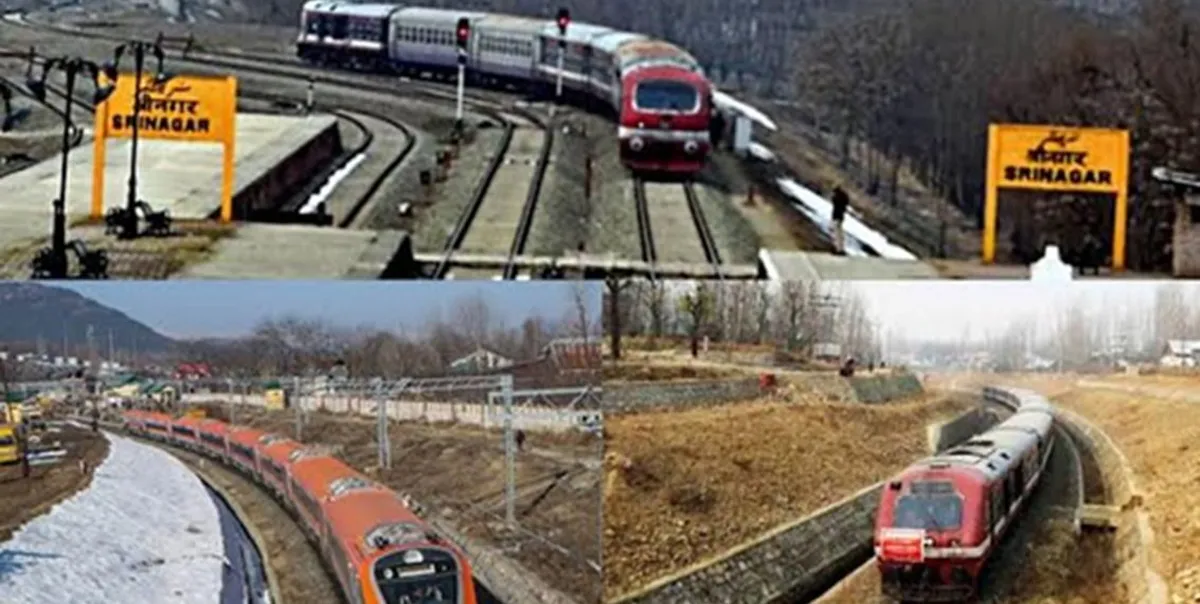In a major infrastructure push for Jammu and Kashmir, the Ministry of Railways has sanctioned two critical railway projects that are expected to transform connectivity, boost tourism and strengthen strategic logistics in the Valley.
The projects include the construction of a new 40.2 km Baramulla–Uri railway line and the doubling of the 73.5 km Qazigund–Budgam stretch, both aimed at integrating the region more closely with the national rail network. The decision comes as the Union Government accelerates investments in road, rail and tunnel infrastructure in the Union Territory. Officials said these railway initiatives would not only improve civilian transport but also carry immense strategic importance due to the proximity of Uri and Baramulla to the Line of Control (LoC) and the armed forces’ reliance on dependable supply chains.
Baramulla–Uri Railway Line
The Ministry of Railways has approved the construction of a new Broad Gauge (BG) line between Baramulla and Uri, covering 40.2 kilometres and connecting five existing stations. The proposed corridor will traverse rugged terrain and sensitive areas, requiring the construction of three Road Under Bridges (RUBs) and nine Road Over Bridges (ROBs). Unlike earlier projects that utilised pre-acquired alignments, this new line will require fresh land acquisition, underscoring the scale and ambition of the plan.
The project is expected to provide all-weather, reliable rail connectivity, addressing frequent road disruptions caused by heavy snowfall, landslides and flash floods in north Kashmir. At present, Uri depends on road transport via the Baramulla–Uri highway, which is often blocked during winter months. Uri, located near the Kaman Post crossing on the LoC, has already emerged as a border tourism hub, attracting visitors to sites like the Aman Setu bridge. With a direct railway link, officials believe tourism in the region could see a significant rise.
“With the new railway line, tourism in the region is expected to receive a substantial boost. The project also holds strategic importance, as Baramulla and Uri host major Indian Army establishments and lie close to the border,” a senior railway official stated. For residents of Uri—long considered one of the most remote border tehsils—the rail link promises improved access and mobility.
Qazigund–Budgam Doubling Project
Alongside the Uri line, the Railways has approved the doubling of the Qazigund–Budgam railway section, covering 73.5 kilometres. Currently, the single-track line between Qazigund and Baramulla creates operational bottlenecks and limits the frequency of services.
“The doubling project is of strategic importance, enabling seamless movement of military special trains carrying personnel, equipment and supplies. Accordingly, it has been designated under the Hill & Strategic Corridor,” the official statement noted. The proposed doubling will run parallel to the existing line, covering 10 stations—nine crossing stations and one halt—all within Jammu and Kashmir. The move is expected to increase capacity, reduce delays and improve punctuality, particularly during peak hours when passenger demand is highest.
Officials also highlighted the project’s economic benefits. Faster movement of goods will support Kashmir’s fruit industry, particularly apple exports, by ensuring quicker and fresher deliveries to major markets.
Strategic and Tourism Impact
Both projects carry profound strategic significance. The Kashmir Valley, hemmed in by the Pir Panjal mountains, has limited road and rail corridors. Harsh weather and security challenges frequently disrupt supplies, making resilient infrastructure essential. The Baramulla–Uri line will connect the frontier town directly to the Valley’s railway grid, offering the armed forces a safer and faster supply chain. Similarly, the Qazigund–Budgam doubling will facilitate smoother operation of special trains, reducing delays in mobilisation.
Tourism officials see the projects as game-changers for the sector. Uri’s transformation into a border tourism destination is already underway, but road bottlenecks remain a challenge. A direct railway link could place Uri on the mainstream tourist map alongside popular destinations like Gulmarg, Pahalgam and Sonamarg. The Qazigund–Budgam doubling will also expand rail tourism in Kashmir, making day trips more feasible by connecting Banihal’s gateway in Jammu with Srinagar’s attractions and Baramulla’s heritage sites. Local businesses—including hoteliers, transporters and traders—expect positive spillover effects once passenger traffic increases.
For the horticulture sector, which is the backbone of Kashmir’s rural economy, faster freight movement will ensure fresher produce reaches markets in Delhi, Mumbai and beyond.
Challenges and Outlook
While the projects have been sanctioned, challenges remain. Land acquisition, especially in densely populated or sensitive border areas like Uri, may face delays. Environmental clearances will also be critical, as parts of the alignment pass through ecologically fragile zones. Engineers will need to overcome difficult Himalayan terrain, potentially involving tunnels, viaducts and slope stabilisation. Past experiences with projects in Kashmir, such as the Udhampur–Srinagar–Baramulla Rail Link (USBRL), have shown that timelines can be extended due to geological surprises, adverse weather and security restrictions.
Despite these hurdles, railway officials remain confident, arguing that the projects form part of a larger vision to make J&K’s transport system resilient, reliable and strategically secure. “The proposal marks another step towards building a resilient and strategically vital railway network in Jammu and Kashmir,” the Ministry said.





















